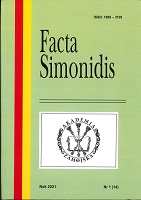Filary (zasady) prawa autorskiego w orzecznictwie Trybunału Sprawiedliwości Unii Europejskiej z lat 2016 – 2017 na tle współczesnych trendów w prawie prywatnym
The Pillars (Principles) of Copyright in the Judicature of the Court of Justice of the European Union in 2016 and 2017 Against the Background of Contemporary Trends in Private Law
Author(s): Paweł Przybytek, Piotr PrzybytekSubject(s): International Law, EU-Legislation, Court case
Published by: OFFICINA SIMONIDIS. Wydawnictwo Uczelni Państwowej im. Szymona Szymonowica w Zamościu
Keywords: copyright; intellectual property law; private international law; Court of Justice of the European Union;
Summary/Abstract: Contemporary copyright law has to face a number of challenges resulting from the dynamic development of modern technologies. First, it must protect authors’ inherent right to own the results of their work. Second, authors are entitled to receive payment for the use of their works, which, in turn, creates an incentive: the third main principle of modern copyright law. Finally, authors should be encouraged to publish their works as it stimulates the development of science and culture. At least three of the above principles (pillars) appear in the judicature of the Court of Justice of the European Union in the years 2016-2017: the first, the second and the fourth. In this respect, the court’s primary objective is to ensure that authors are remunerated appropriately. However, it is also emphasised that it is difficult to separate property right from personal rights. This problem has been demonstrated in the present analysis, too. It has already been noticed that the bodies of the Communities have made a significant contribution to the shaping of copyright protection patterns in response to the flourishing of new technologies. In our analysis, there is a noticeable tendency to legally equate traditionally created works with their digital counterparts.
Journal: Facta Simonidis
- Issue Year: 14/2021
- Issue No: 1
- Page Range: 91-124
- Page Count: 34
- Language: Polish

